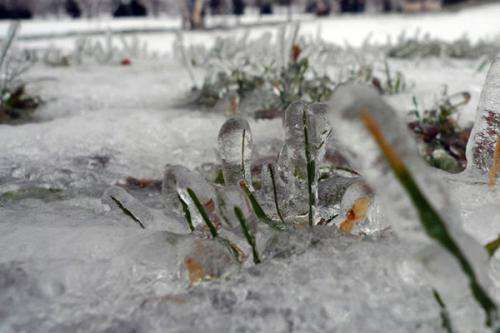Explaining "frostquakes"

You may have heard about "frostquakes" with the recent cold weather in the GTA and other areas of Southern Ontario. You may even have heard one yourself. Professor Bill Gough, a climatologist at the University of Toronto Scarborough, discusses this phenomenon with one of his graduate students, Andrew Leung, a second-year student in the UTSC PhD program in environmental sciences.
Gough: Andrew, over the past couple of weeks Toronto has experienced a wide range of severe weather. One interesting aspect of these weather events is the frostquake. This is a new term for most of us. It was an article in the media that quoted UTSC graduate and local weather media meteorologist Natasha Ramsahai that alerted me to this relatively rare phenomenon. You've done some research on this recently. So, what is a frostquake?
Leung: A frostquake is a natural phenomenon. Similar to an earthquake, a frostquake generates very minor ground shaking and cracking sound or "boom" that is on a much smaller scale than an earthquake.
Gough: Have you heard one?
Leung: Yes, in fact I've heard several.
Gough: On December 24th, many tree branches were falling in my neighbourhood and so I am not sure if what we heard was a frostquake. What causes the 'boom' or cracking sound that characterizes a frostquake?
Leung: When water enters soil leading to saturation and suddenly freezes, the water becomes ice and expands inside the soil. Slowly, all the spaces in the soil are used up which cause the soil pressure to build. Eventually the pressure reaches a critical point and the soil gives way to release the pressure. As the pressure is being released, it causes cracking or thundering noises. Snow is an effective insulator, so shallow or no snow cover is also a necessary requirement for this deep freezing.
Gough: Frostquakes are relatively rare events and there are few studies of these in the scientific literature. Part of this results from no formal monitoring of frostquakes. How has social media changed this?
Leung: You're right. Since the vibrations from the frostquakes are often localized, seismic monitoring stations cannot record their occurrences. The scientific literature has reported frostquakes in the New England area, Michigan, and Wisconsin in the past. When Canadians first heard the noise on the night of December 24th and reported it on Twitter and Facebook, many assumed, as you did, that it was falling tree branches as a result of the ice storm. Soon it became clear that it was no coincidence the tree-falling noise was heard at the same time in different parts of the city. Weather reporters and meteorologists provided their opinions on the cause of those noises. Word spread quickly and by the next morning, all the major news media outlets in Toronto reported that what the public heard the previous night were frostquakes. Through social media, the public reported this rare phenomenon quickly and definitively.
News reports made the public aware of frostquakes and people were able to identify subsequent frostquake events on the nights of January 2nd and 6th. I monitored Twitter and Facebook looking for frostquake reports and the locations where they were observed. I found that frostquakes were reported in much of southern Ontario, ranging from Sarnia in the west to Ottawa in the east and from St. Catharines in the south to Barrie in the north. I also found that this could happen during daytime and nighttime. People living in houses and apartments heard the boom and experienced the tremor.
Gough: Can frostquakes be predicted?
Leung: Even though frostquakes are rare, they can be predicted by considering relevant meteorological and environmental factors. A critical factor is shallow or no snow cover, which allows precipitation to saturate the soil. Typically a thawing occurs followed by a quick deep freeze that causes the water within the soil to expand. The Climate Lab at UTSC was able to forecast the frostquakes that occurred on January 6th.
Gough: Are frostquakes a danger?
Leung: Frostquakes are mild nuisances. While they may wake people up and animals who were asleep at that time, they don't pose much of a risk. However, the conditions that lead to frostquakes can also cause buried pipes to freeze, which would normally be insulated by a deep snow cover.
Provided by University of Toronto



















